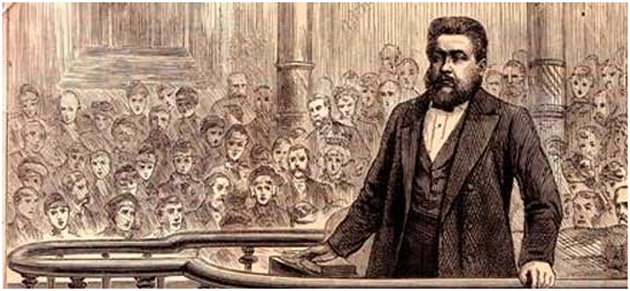The heart of Charles Spurgeon's theology summed up in ten points.

It was 160 years ago when the beloved prince of preachers Charles Spurgeon finished writing his own Catechism.
Basing it upon the Westminster Shorter Catechism (1648) and the London Baptist Confession of Faith (1689) as well as the 1693 Baptist Catechism, Spurgeon used his new Catechism for doctrinal instruction at his local church.
Spurgeon’s Catechism summarized the key teachings of the Christian faith and the famous pastor encouraged his flock to learn it off by memory. In total, it sported some eighty-two questions and answers. They deal with the non-negotiable elements of Evangelical doctrine and represent the marrow of what the English preacher taught.
Today, we’re going to condense the whole document into the following ten points:
1.- Man’s purpose
(Question 1)
Spurgeon follows the lead of the Westminster Shorter Catechism by defining humankind’s purpose as that of glorifying God and enjoying Him forever. Humanity cannot find ultimate satisfaction in riches or pleasures but in living for the glory of God.
2.- The Bible is the Word of God
(Questions 2-3; 72-73)
Spurgeon knew that man’s chief end was to glorify God because he had learned so from Scripture. It is the Bible that teaches what we must know about God and what He demands of us. The Bible, therefore, is wrapped up with our faith and conduct. The Word is so important because it convicts and converts sinners instilling within them a passion for holiness and joy. This is why Spurgeon always stressed the need to draw near to the Bible with a reverent spirit, treasuring its teachings in our heart. Nothing can replace God’s holy Word.
3.- God
(Questions 4-11)
Spurgeon’s God is the blessed Trinity. He is the God who has predetermined all things for His own glory and He carries out His sovereign plan via creation and providence. The difference between creation and providence is that whereas the former has to do with God’s initial creation of the cosmos from nothing, the latter hones in upon how the Lord continues to uphold all things according to the word of His power.
4.- Humankind
(Questions 12-18)
God’s masterwork is humanity. Sadly Adam –the first man created- sinned against the Covenant of Life and therefore brought all of his posterity into a state of condemnation. Every single human being is born enslaved to sin and is thus destined for both physical and spiritual death.
5.- The Redeemer
(Questions 19-27)
In spite of humanity’s fall, the Good News is that God –by His pure good pleasure- decided from eternity past to save some for eternal life. He made a Covenant to deliver them from their accursed state of sin and condemnation by means of a Redeemer. Who is this Redeemer? The Lord Jesus Christ! It is He who saves His people thanks to His death and resurrection by taking their sins upon Himself to appease the divine wrath. Since the wrath of God fell upon the Saviour, those who belong to Him are thus loosed from future damnation.
6.- The Spirit of God
(Questions 28-35; 69-71)
How, then, is the marvellous saving work of Emmanuel applied to believers? Answer: Through the ministry of the Holy Spirit. He applies the perfect righteousness of Christ to the elect via the gift of faith, which always produces repentance in the hearts of its recipients. This faith entails a host of spiritual benefits in the lives of believers: justification, adoption, sanctification, etc. Thanks to these sweet blessings, the child of God is guaranteed divine love, a cleansed conscience, the joy of the Spirit, grace beyond all measure and the assurance of his/ her eternal salvation. As one progresses in the Christian pilgrimage, the Spirit strengthens believers by means of the Word, baptism, the Lord’s Supper and prayer.
7.- The End Times
(Questions 36-39)
Spurgeon taught that the dying believer went directly into God’s presence even when their bodies remained in the tomb until the Final Resurrection. On that great Final Day, the believer will be reunited with his/ her body –which will be glorified- and so enjoy God forevermore throughout all eternity. Unbelievers, alas, will be cast into the torments of hell upon death and on the Final Judgment shall be condemned in body and soul throughout the ages alongside the devil and all his wicked angels.
8. The Law
(Questions 40-68)
The biggest part of Spurgeon’s Catechism takes up the theme of God’s moral Law as it is revealed in the Ten Commandments. This Law sought to teach love for God and neighbour above all other things. Nobody can keep the Law perfectly given the introduction of sin into the world; nevertheless, the bliss of the Gospel is that all our shortcomings are pardoned due to the precious blood of the Redeemer.
9.- Baptism
(Questions 74-79)
Baptism is a sign of the believer’s communion with Christ. Through baptism, Christians identify with their Saviour’s death, burial and resurrection. Spurgeon opposed infant baptism as he was convinced that it should only be administered to those who truly professed faith and repentance according to the Gospel call. He also defended baptism by immersion as opposed to baptism by aspersion.
10.- The Lord’s Supper
(Questions 74; 80-82)
As in the case of baptism, the Lord’s Supper is but a sign that edifies believers who should continually examine themselves before partaking of the bread and wine lest they eat and drink condemnation unto themselves. The believer should celebrate the Lord’s Supper until Christ returns when they will be filled with everlasting joy.

Las opiniones vertidas por nuestros colaboradores se realizan a nivel personal, pudiendo coincidir o no con la postura de la dirección de Protestante Digital.
Si quieres comentar o